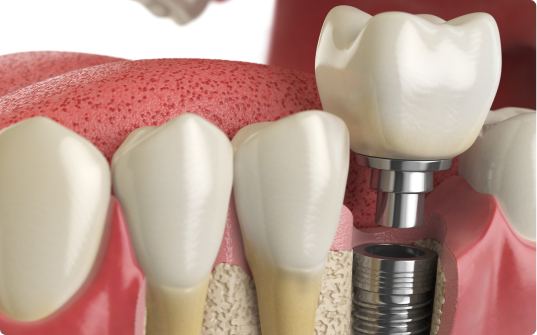-
Mon-Thur: 9AM - 5PM
6108763300

Dental implants have revolutionized the field of dentistry, offering a permanent solution to missing teeth that goes beyond traditional bridges and dentures. In this comprehensive guide, we'll explore the various aspects of dental implants, from their types and benefits to the procedure itself and post-implant care.
Understanding Dental Implants:
What are Dental Implants? Dental implants are titanium posts surgically placed into the jawbone, acting as artificial roots for replacement teeth. These implants provide a sturdy foundation for crowns, bridges, or dentures, restoring both function and aesthetics.
Types of Dental Implants: There are three main types of dental implants:
Benefits of Dental Implants:
Natural Look and Feel: Dental implants closely mimic the appearance and function of natural teeth, providing a seamless and comfortable solution.
Enhanced Oral Health: Unlike traditional dentures, implants don't compromise the health of adjacent teeth. They integrate with the jawbone, preventing bone loss and maintaining the integrity of the surrounding dental structure.
Durability and Longevity: With proper care, dental implants can last a lifetime, making them a durable and cost-effective option for tooth replacement.
The Dental Implant Procedure:
Consultation and Planning: The journey begins with a thorough examination and consultation. X-rays and scans help the dentist assess the health of your jawbone and determine the optimal implant placement.
Implant Placement: During the surgical procedure, the dental implant is placed into the jawbone. The site may be left to heal for a few months, allowing the implant to fuse with the bone in a process called osseointegration.
Abutment Placement: Once the implant has integrated, an abutment is attached to the implant, acting as a connector between the implant and the replacement tooth.
Crown, Bridge, or Denture Attachment: The final step involves attaching the customized crown, bridge, or denture to the abutment, completing the restoration.
Post-Implant Care:
Oral Hygiene: Maintain excellent oral hygiene by brushing, flossing, and using an antiseptic mouthwash. Regular dental check-ups are crucial to monitor the health of the implant and surrounding tissues.
Dietary Considerations: Avoid chewing on hard substances, such as ice or pens, and limit your intake of sticky or overly hard foods that may strain the implant and restoration.
Quit Smoking: Smoking can hinder the healing process and increase the risk of implant failure. Quitting smoking is highly recommended for those considering or undergoing dental implant treatment.
Regular Follow-ups: Schedule regular follow-up appointments with your dentist to ensure the continued success of your dental implants. Early detection of any potential issues is key to prompt intervention.
Potential Complications and Considerations:
Osseointegration Issues: In some cases, the implant may not successfully fuse with the jawbone. Proper patient selection and adherence to post-surgical care guidelines help minimize this risk.
Infection: While rare, infections can occur at the implant site. Strict adherence to post-operative care and regular dental check-ups mitigate this risk.
Bone Resorption: Over time, the jawbone may naturally change shape, affecting the fit of the implant-supported restoration. Regular check-ups and potential adjustments can address this concern.
Dental implants represent a transformative solution for individuals with missing teeth, providing a natural-looking and long-lasting replacement option. With advancements in technology and surgical techniques, the success rate of dental implants is higher than ever. If you're considering dental implants, consult with a qualified dental professional to explore personalized options tailored to your unique needs. Remember, a healthy smile contributes significantly to overall well-being, and dental implants offer a reliable pathway to achieving just that!
